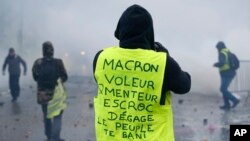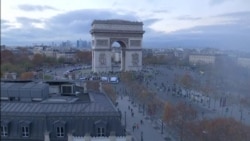Nearly 100 people, including 16 police officers, have been injured and more than 200 arrested after a protest turned violent in central Paris Saturday, officials said.
For the third straight week, protesters descended on one of Paris' most famous boulevards, the Champ Elysees. Clashes with police began early Saturday near the Arc de Triomphe and continued into the night, with authorities struggling to contain the mayhem.
French President Emmanuel Macron said the protesters were seeking to spread chaos and discontent, and that their violence could not be justified. Speaking at a news conference at the G-20 summit in Buenos Aires, he said he would convene a meeting of senior ministers about how best to respond as soon as he returned home.
WATCH: Police, Protesters Tangle in Paris
"No cause justifies that security forces are attacked, shops pillaged, public or private buildings are set on fire, pedestrians or journalists threatened or that the Arc de Triomphe is sullied," Macron said.
Protesters created roadblocks in the middle of some streets, smashed storefront windows, lit fires and threw rocks at police, who responded with tear gas, stun grenades and water cannons. By comparison, other demonstrations held elsewhere in France were largely peaceful.
By Saturday afternoon, police said at least 224 people had been arrested in Paris. At least 80 people had been injured, including the riot police, authorities said.
Demonstrators are taking to the streets over frustrations about escalating taxes, especially on gasoline, and Macron's leadership.
Many of the protesters are wearing the yellow fluorescent vests that French drivers keep in their cars. The demonstrations have become known as the "yellow jacket" protests.
Prime Minister Edouard Philippe said that 5,000 police had been deployed around the city to help contain the protests.
The Associated Press new service reports that all subway stations in and around the Champs Elysees have been closed for security concerns.
About 36,000 people, including about 5,500 in Paris, were protesting around the country, Philippe said.
Last week, the protests turned violent with the confrontations between the demonstrators and the police evoking memories of city's 1968 civil unrest.
Officials say 8,000 people turned out for the protests in the City of Lights last week, with more than 100,000 mounting demonstrations across the country.
Macron insists the fuel taxes are needed to reduce France's dependence on fossil fuels and to fund renewable energy investments.








